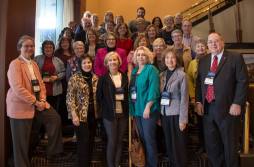 This past week I was delighted to attend the Salt Lake Institute for Genealogy (SLIG) at Salt Lake City, Utah and I want to tell you a bit about it. An institute for genealogy is usually five days of intensive study and lectures on a single topic related to genealogy. This year there were 14 tracks and you had to pick one– a difficult task. I selected “Family History Law Library” taught by Judy Russell (left) and Rick Sayer (right; I’m behind Rick.) in the photo at left.[1] Other speakers included Claire Bettag (Civil Law), David Rencher of Family Search (Irish Law) and Warren Bittner (German Law).
This past week I was delighted to attend the Salt Lake Institute for Genealogy (SLIG) at Salt Lake City, Utah and I want to tell you a bit about it. An institute for genealogy is usually five days of intensive study and lectures on a single topic related to genealogy. This year there were 14 tracks and you had to pick one– a difficult task. I selected “Family History Law Library” taught by Judy Russell (left) and Rick Sayer (right; I’m behind Rick.) in the photo at left.[1] Other speakers included Claire Bettag (Civil Law), David Rencher of Family Search (Irish Law) and Warren Bittner (German Law).
I always come out of these institutes with a larger number of genealogy buddies, new information on the topic and a renewed enthusiasm for genealogy, which I did not have before. This session was no different.
Working in the law has always intimidated me and so I hoped to come away with some basic knowledge of how to think about my immediate problem and how to then access the law.
A concept that clarified much of my thinking were the four questions to ask yourself when you have identified that your problem might be answered in the law:
- What is the type of court where this problem might be resolved?: local, state, Federal, or special?
- Could the topic be covered in a chartering document, like a constitution? If so then you need to look at the constitution or similar document of that state or country.
- Is it Statutory law? And, if so, is it territorial, colonial or state?
- Is it common law and covered through precedent?
Once you have answered the above questions then you have a road map to finding the answer to your question in the law.
There are a number of good websites for finding Federal level law:
- Google Books: many of the older Federal and state laws are in scanned books: https://books.google.com/
- Century of Law Making for a New Nation (up to 1878): https://memory.loc.gov/ammem/amlaw/lawhome.html
- HienOnline ($$; contains more current Federal law): http://home.heinonline.org/
- Constitution Society (for chartering documents): http://www.constitution.org/
The state laws can best be found by googling name of the state, “law” and then any additional identifiers–“territorial” or “colonial” law, and type of problem, e.g. mental health, immigration, or voting age, for example. These documents are often found on a governmental website for the state of interest.
Happy hunting!
Jill
What I have done since the last posting: Attended SLIG, started “bullet journaling” based on an Association of Professional Genealogist Quarterly article (it has greatly improved my efficiency.) Have alerted several groups etc. that I have received the credential of Certified Genealogist; interviewed 3 new clients; continue to work on transcriptions of findings from my summer sabbatical, cleaned up some webinars and conducted two (Illinois and Southern California with Wisconsin at the end of March.) Did some research on my elusive Eilerts and withdrew my proposals from APG-Professional Management Conference to be held in September in DC. I am still waiting to hear from BYU, and I did a bunch of other stuff related to being SGS President. Whew! busy month.
[1] Salt Lake Institute of Genealogy (SLIG) 2017, Class 9, The Family History Law Library, photograph, January 2017, digital image, Shelley Lewis, photographer, used with permission; SLIG 2017 (https://www.facebook.com/groups/SLIG2016/ : accessed 2 February 2017, 8:10 am).